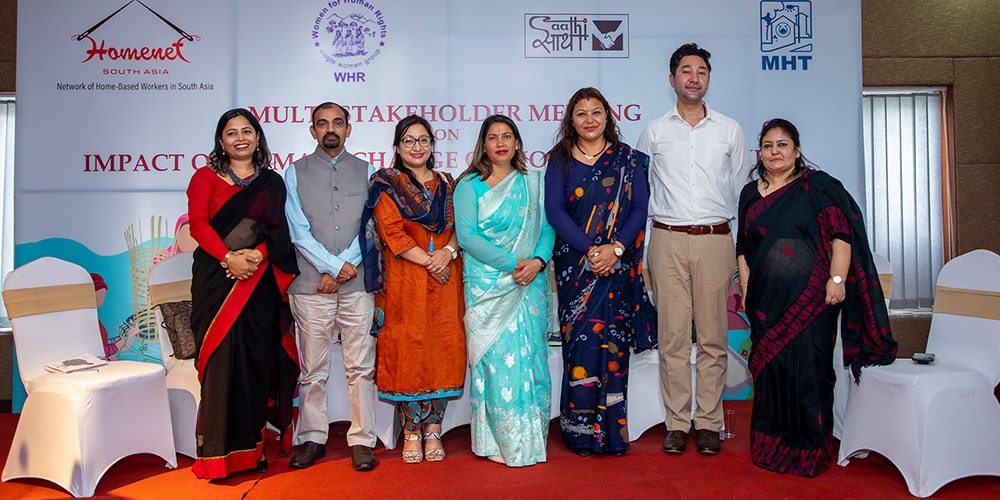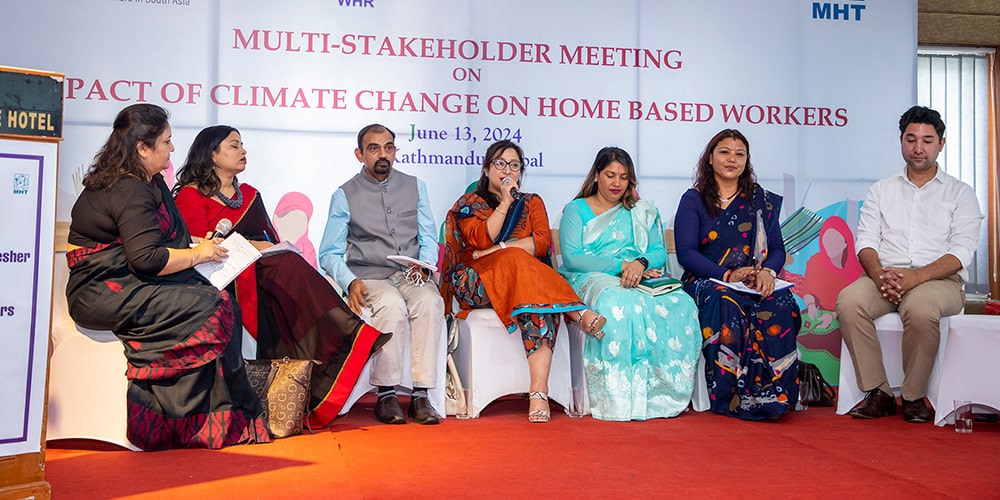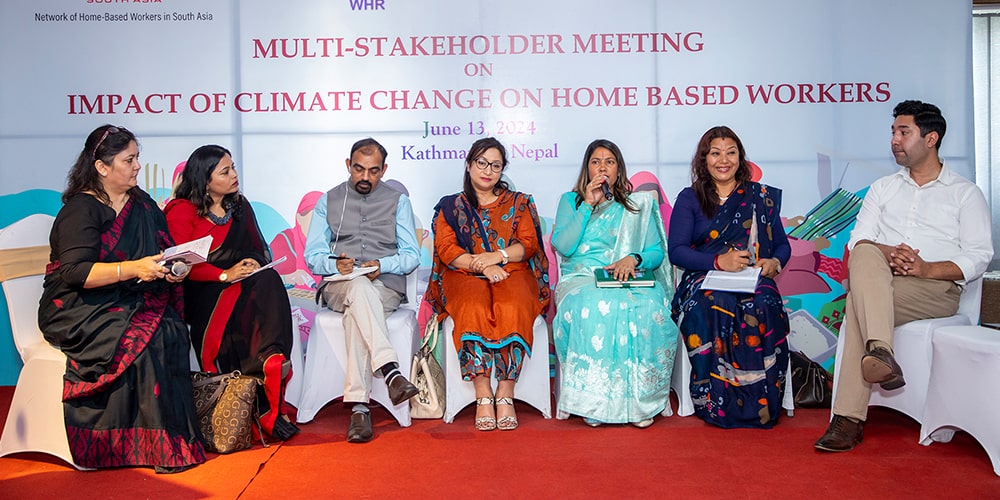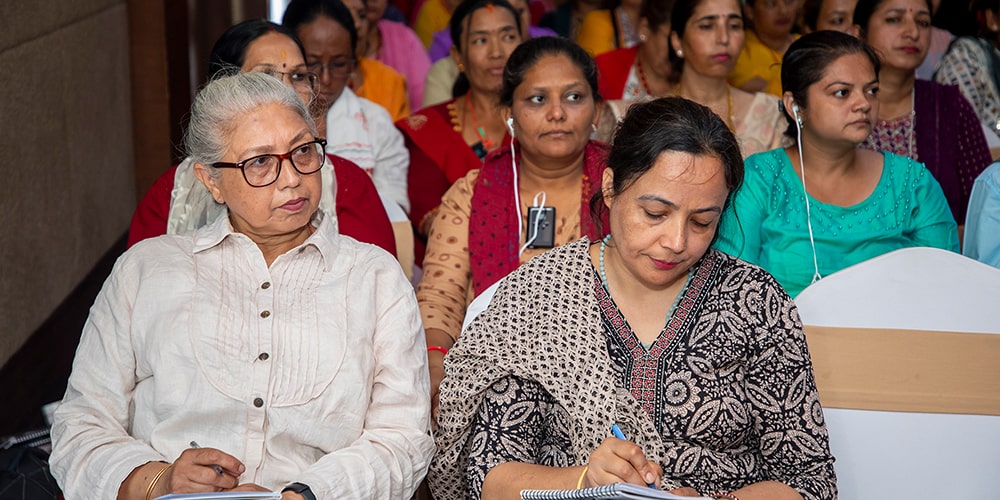On June 13th, 2024, a significant multi-stakeholder meeting took place in Nepal, focusing on the impact of climate change on home-based workers (HBWs). Representatives from local governments, civil society organisations, and international organisations gathered to discuss the pressing challenges faced by these workers and explore actionable solutions.
The meeting commenced with a welcome address from Ms. Sristi Joshi Malla, the Regional Coordinator for HomeNet South Asia. She expressed gratitude to all participants and trainers for their commitment to improving the lives of HBWs in the context of a changing climate.
Insights from the Panel
A panel discussion featured key speakers, each bringing valuable insights to the table:
Ms. Sirjana Burlakoti : The Deputy Mayor discussed the lack of climate change awareness and initiatives among municipalities, emphasising the need for awareness programs for HBWs and home workers. She noted the health issues faced by HBWs due to chemical exposure and pollution, stressing the importance of understanding the differences between HBWs and home workers. Despite challenges, efforts are being made to improve HBW recognition, especially in advanced regions like Budhanilkantha. She called for better education and informed policies to address these pressing issues.
Ms. Basanti Tamang Dangol: Highlighting the backwardness of Dakshinkali municipality compared to Kathmandu, the Deputy Mayor invited NGOs and INGOs to partner for sustainable development. She detailed the adverse effects of climate change on agriculture, the region’s primary livelihood, and the challenges in market access for locally produced items. She emphasized the need for improved infrastructure and transportation to support HBWs and farmers, advocating for forward-thinking strategies to combat the impacts of climate change.
Mr. Nitin Macwan: Representing MHT, Nitin Ji described their 30-year effort to integrate HBWs into mainstream society, focusing on slum areas. He highlighted MHT’s role as a bridge between HBWs and the government, assisting with policy rectification, community engagement, and awareness. Key initiatives include vulnerability mapping, heat-proof paints, cool stations, and partnerships for creating climate action plans. He praised local government involvement and offered MHT’s expertise for future collaborations and policy implementations.
Ms. Anu: T he ICIMOD representative discussed the broader impacts of climate change, emphasising the interconnectedness of global environmental issues. She highlighted sustainable practices such as organic farming and the protection of natural resources. ICIMOD advocates for integrating climate change considerations into all economic activities and policies. The representative stressed the importance of sustainable harvesting and called for collective action to prevent resource exploitation and ensure long-term environmental health.
Mr. Amun Thapa: Amun Thapa commended HBWs for their contributions to reducing carbon emissions by working from home. He raised concerns about severe air pollution in Kathmandu, the adverse effects on native species, and the overwhelming volume of waste going to landfills. Thapa highlighted his company’s recycling efforts and the need for a broader recycling culture in Nepal. He advocated for sustainable business practices, the expansion of e-commerce to rural areas, and bridging the digital divide between urban and rural regions.
Ms. Goma Pandey: Goma Ji emphasized the importance of training programs for HBWs to implement climate change knowledge in their communities. She discussed collaborations with trade unions, the creation of podcasts and booklets, and the need for effective climate change measures. Goma Ji pointed out the challenges in public notice dissemination and the government’s budget allocation for local initiatives. She called for integrating HBW voices into climate change discussions and policies, highlighting the need for improved insurance policies and worker advocacy.
Action Plans for a Sustainable Future
After insightful presentations, the panelists proposed actionable strategies to tackle the challenges identified during the discussion:
Ms. Sirjana Burlakoti, Tarkeshwor Nagarpalika Deputy Mayor: The Deputy Mayor proposed several actions to improve the situation of HBWs. She mentioned that 40 people had already undergone training and suggested gathering their feedback to refine future initiatives. She emphasized the importance of integrating HBWs into local government activities and committed to allocating a small budget to support them. Recognizing the shy nature of HBWs and the weak implementation of previous programs, she stressed the need for increased awareness alongside budgeting. She expressed hope that the knowledge gained from training sessions would be shared among HBW communities to foster a supportive network.
Ms. Basanti Tamang Dangol, Dakshinkali Deputy Mayor: The Deputy Mayor committed to addressing HBW issues in the upcoming local government budget discussions. Inspired by the production of school dresses in her region, she announced plans to start producing fabric bags and garments to replace plastic bags, which are often discarded irresponsibly. These fabric bags would be distributed to every household, aiming to reduce plastic waste and provide a sustainable alternative.
Mr. Nitin Macwan: Nitin Ji highlighted the impact of heat on productivity and proposed creating a knowledge hub to address the lack of affordable technology. He suggested implementing MHT’s model of Climate Sathi and community ambassadors who raise awareness about climate conditions. He called for a tripartite agreement to bring local technologies that don’t require electricity to Nepal. Nitin Ji urged the government to integrate their model into the system for better implementation, not just training and awareness. He expressed readiness to collaborate and develop a strategy with partners for mainstreaming climate action.
Ms. Anu: Anu outlined ICIMOD’s focus on generating knowledge and bringing investments rather than direct implementation. She mentioned their plan to submit a proposal for women’s economic empowerment, targeting women from indigenous regions and those with disabilities in Pradesh 2. Anu expressed optimism that despite limited funds, significant progress could be made in advocating for women with disabilities. She highlighted the potential for increased funding in this area in the coming years.
Mr. Amun Thapa: Amun Thapa committed to involving MPs from 2-3 countries in sustainable initiatives and establishing a community to support these efforts. He shared plans to expand a recycling centre from Budhanilkantha to Dakshinkali and other regions. Emphasising the need for support for single women, Amun highlighted the importance of sustainable practices and the expansion of recycling initiatives.
Ms. Goma Pandey: Goma Ji reaffirmed Class Nepal’s commitment to supporting HBWs and climate change initiatives. She offered to connect groups already active in the region with those needing support. While not experts in climate change, they pledged to join positive endeavours and raise awareness among trade unions to mainstream climate change issues. Goma Ji also mentioned the need to revise insurance policies related to climate change and advocated for making worker issues a priority in climate change discussions. She committed to amplifying workers’ voices in the broader climate change narrative and promoting their interests.







